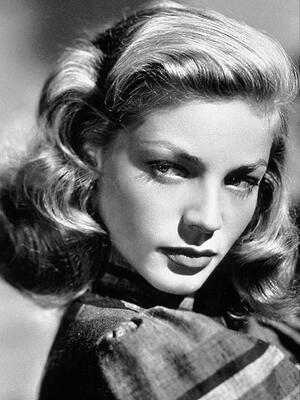Lauren Bacall
Growing up in Canada, a favorite game my family and friends played involved trying to identify all the famous Jewish stars in Hollywood who had changed their names. What else are you going to do in Winnipeg when it’s twenty below? “You know he/she is Jewish,” or “I bet he/she is Jewish,” was a common comment at any gathering.
We were proud of them, never judged them. It was common knowledge how hard it was to “make it,” even without being saddled with a difficult name. Besides, many families we knew had gone through an immigration process to come to Canada or the United States that entailed Anglicizing or butchering Eastern European names.
My grandmother loved to point out that Jack Benny and George Burns were Jewish. My mother’s favorites were Eddie Fisher, Kirk Douglas and Tony Curtis. I was enthralled by Lauren Bacall. And learning more about her from some of the obits and articles I’ve read since she died in August, I’ve become even more impressed—but for so much more than her becoming a stage and screen legend.
I discovered that despite changing her name, she was a lifelong liberal with a capital L, a New York Jewish leftie, who was the “director” of the politics in her marriage to Bogart. For me, that’s what magnified her mere celebrity into esteem and admiration.
I always knew the general story of her life: born Bette Joan Perske to a Jewish family in the Bronx in 1924, taking her grandmother’s name, Bacall, landing on the cover of Harper’s Bazaar when she was eighteen, then being spotted by director Howard Hawks’ wife and whisked off to Hollywood where she attained instant stardom and met Humphrey Bogart on the set of her very first movie. They married and became Hollywood royalty, the “it” couple of their time.
When Bogart died, she refused to become a professional Hollywood widow at 32, instead moving back to New York and going on stage, winning Tony awards for Applause in 1970 and Woman of the Year in 1981. It seemed a fairy tale life with echoes of Isaac Bashevis Singer; fame, fortune, three children she adored, but etched with the tragedy of Bogart’s early death and a divorce from her second husband, Jason Robards.
Lauren Bacall always insisted on being called Betty to her friends, a small but important challenge to the Hollywood machine that changed her name. “I felt totally Jewish and always would,” she claimed, and never hid her Jewish origins.
But it was through larger and more important challenges to the system that Betty made her mark, one just as indelible as her screen image. Often portraying arrogant, haughty characters, she could be just as commanding and persuasive in real life. Despite her youth and the risk to her career when she was just starting out, she convinced Bogart, a lifelong Republican, to vote Democratic. Then she convinced him of a lot more.
During Hollywood’s infamous blacklist in the 1950s, Bacall persuaded Bogart to create the Committee for the First Amendment to denounce the blacklist. Despite the possibility of destroying their careers and enormous pressure to recant, they instead led a delegation of prominent Hollywood stars to Washington D.C. to protest the House Un-American Activities Committee. Their picture was front-page news all over the country. They never betrayed their friends or “named names.”
It seems that despite Bogie’s tough-guy screen image, he was a shy, soft-spoken man in real life. It was his passionate, Jewish, leftie Democrat wife who was the initiator and driving force of their political life. As she proudly boasted in a late interview, “I’m anti-Republican. A liberal. The L-word!” And that’s now the permanent postscript I have in my memory of her remarkable life.




As a young boy, I was a fairly precocious musician and I used to deputize playing the organ for the sabbath morning services at the Westminster Synagogue in Knightsbridge, London, (which was a Reform congregation - there is no organ in a traditional or orthodox synagogue). It was about 1972 and I was fortunate to be playing the morning service on the day Bette Joan Perske (Lauren Bacall) came for Shabbas. She was a strikingly lovely looking woman, tall and imposing in appearance. She was mobbed by people after the service, so I felt very flattered when, after playing everybody out of the synagogue at the end of the service and shutting down the organ, I came next door to the banqueting room for the kiddush and she immediately shook off everyone and came over to congratulate me and ask about my music ‘career’. I was able to impress her with the response, “Well, I grew up playing piano and violin but I am actually a medical student”. I was in my teens, but she was still beautiful enough to get my heart rate up! To say I felt flattered would be an understatement: I was getting personal attention from Humphrey Bogart’s favorite co-star. This would have been happening in about 1970 or 71.
A females female.
A male's dream.